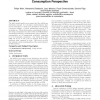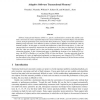63 search results - page 3 / 13 » On the (dis)similarity of transactional memory workloads |
ISLPED
2010
ACM
13 years 4 months ago
2010
ACM
The shift towards multicore processors and the well-known drawbacks imposed by lock-based synchronization have forced researchers to devise new alternatives for building concurren...
SBACPAD
2008
IEEE
13 years 12 months ago
2008
IEEE
Transactional memory is emerging as a parallel programming paradigm for multi-core processors. Despite the recent interest in transactional memory, there has been no study to char...
SPAA
2010
ACM
13 years 10 months ago
2010
ACM
When a program uses Software Transactional Memory (STM) to synchronize accesses to shared memory, the performance often depends on which STM implementation is used. Implementation...
WDAG
2005
Springer
13 years 11 months ago
2005
Springer
Software Transactional Memory (STM) is a generic synchronization construct that enables automatic conversion of correct sequential objects into correct nonblocking concurrent obje...
EUROSYS
2007
ACM
14 years 2 months ago
2007
ACM
Software transactional memory (STM) is a promising technique for controlling concurrency in modern multi-processor architectures. STM aims to be more scalable than explicit coarse...


